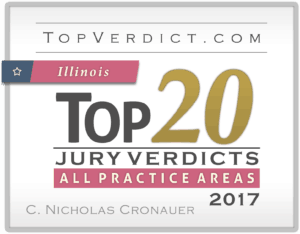

























Workers’ compensation is a no-fault system of benefits paid by employers to workers who experience work-related injuries or diseases.
The Illinois Workers’ Compensation Commission resolves disputes between employees and employers regarding work-related injuries and illnesses. A case is first tried by an arbitrator, whose decision may be reviewed by a panel of three commissioners. Cases may then be appealed to the circuit court, Appellate Court, and Illinois Supreme Court. Like most court systems, the vast majority of disputes are resolved by settlement.
Workers’ compensation is a system of benefits provided by law to most employees who experience work-related injuries or occupational diseases. Generally, benefits are paid regardless of fault.
The Illinois Workers’ Compensation Commission is the State agency that administers the judicial process that resolves disputed workers’ compensation claims between employees and employers.
The Commission acts as an administrative court system for these claims.
As the administrative court system, the Commission must be impartial. Staff explains procedures and basic provisions of the law to members of the public, but cannot provide legal advice or act as an advocate for either the employee or employer.
Most employees who are hired, injured, or whose employment is localized in the State of Illinois are covered by the Act. These employees are covered from the moment they begin their jobs.
The Workers’ Compensation Act provides that accidents that arise out of and in the course of employment are eligible to receive workers’ compensation benefits. This generally means that the
Act covers injuries that result in whole or in part from the employee’s work.
The Act provides the following benefit categories:
No. Workers’ compensation benefits are not taxable under state or federal law and need not be reported as income on tax returns.
By law, the employer is responsible for the cost of workers’ compensation benefits. Most employers buy workers’ compensation insurance, and the insurance company pays the benefits on the employer’s behalf. No part of the workers’ compensation insurance premium or benefit can be charged to the employee. Other employers obtain the state’s approval to self-insure, which means that the employer will be responsible for paying its own claims. To identify the party responsible for paying benefits, an employee may check the employer’s workplace notice, check the Commission’s website, or contact the Commission at [email protected] or toll-free at (866) 352-3033.
Employers are obligated to follow the provisions of the Workers’ Compensation Act. Employers must:
Employers are prohibited from doing the following:
The employee should give the employer’s name and address, and the date of injury, to the Commission’s Insurance Compliance Division. The Division can be reached at [email protected] or at 312/814-6611, toll-free 866/352-3033.
Yes. There are various provisions in the Workers’ Compensation Act that address this issue.
Negligent failure to provide workers’ compensation insurance coverage is punishable by a Class A
misdemeanor for each day without coverage (maximum 12 months imprisonment, $2,500 fine).
Knowing failure to provide workers’ compensation insurance coverage is punishable by a Class 4
felony for each day without coverage (maximum 1-3 years imprisonment, $25,000 fine).
An uninsured employer may also be subject to a civil penalty of $500 for every day it lacked
insurance, with a minimum $10,000 fine.
Employers without workers’ compensation insurance may be subject to a citation issued by the Insurance Compliance Division. The citation fine may range from $500 to $2,500.
An uninsured employer loses the protections of the Workers’ Compensation Act for the period of noncompliance. That means an employee who was injured during the period of noncompliance may choose to sue in civil court.
In addition, if the Commission finds that an employer knowingly failed to provide insurance coverage, it may issue a stop-work order and shut the company down until it obtains insurance.
Yes. Workers’ compensation fraud falls into many different categories that affect employees, employers, and healthcare providers. The Act prohibits the intentional filing of any fraudulent workers’ compensation claims or making a fraudulent statement to obtain workers’ compensation benefits. Workers’ compensation fraud may also involve making false statements in order to deny workers’ compensation benefits. It is also unlawful to intentionally present a bill or statement for the payment of medical services that were not provided.
Assisting or conspiring in any of these actions may also be considered workers’ compensation fraud.
The penalties for violations of the fraud provisions increase with the value of the property obtained or attempted to be obtained, starting with a Class A Misdemeanor for property valued at $300 or less (maximum 12 months imprisonment and a $2,500 fine), and ranging upwards to a Class 1 felony (maximum 4-15 years imprisonment, $25,000 fine) for property valued at more than $100,000. A convicted party is required to pay complete restitution, as well as court costs and attorney fees.
If you wish to report a possibly fraudulent situation, contact the Workers’ Compensation Fraud Unit, Department of Insurance ([email protected]; toll-free 877/923-8648). Anyone who intentionally makes a false report of fraud is subject to a Class A misdemeanor (maximum 12 months imprisonment, $2,500 fine).
The employee should inform their supervisor within 45 days from when your were injured. You must explain who was involved, what happened, where was the incident, when did you get injured, and list ALL of your injuries.
You must tell your supervisoer with 45 days fo the accident, Included information about who was involved, where did the incident happen, how did you receive your injuries, and be clear about all of your injuries
Generally, the employee must notify the employer as soon as practicable, but no later than 45 days after the accident. Any delay in the notice to the employer can delay the payment of benefits.
For injuries resulting from radiological exposure, the employee must notify the employer 90 days
after the employee knows or suspects that he or she has received an excessive dose of radiation.
For occupational diseases, the employee must notify the employer as soon as practicable after he or
she becomes aware of the condition.
The employer should promptly take the following steps:
Employers must maintain accurate records of work-related deaths, injuries, or illnesses. This does not include minor injuries requiring only first aid and not involving further medical treatment, loss of consciousness, restriction of work or motion, or transfer to another job.
Yes. Employers are required to report accidents to the Commission on the form, “Employer’s First Report of Injury” which is known as the Form 45. The Form 45 is available on the Commission’s website, http://www.iwcc.il.gov/forms.htm.
Written reports of all job-related deaths must be made to the Commission within two working days.
Written reports of job-related injuries or illnesses resulting in the loss of more than three scheduled workdays must be made within one month. Employers are not required to submit a Form 45 for injuries that do not result in three or less days of lost work.
Accident reports should be submitted electronically. For information on how to submit accident reports electronically, please visit the Commission’s website at http://www.iwcc.il.gov/forms.htm.
Yes. Employers are required to post a notice developed by the Commission at each respective place of employment. The Commission maintains a copy of this notice on its website at http://www.iwcc.il.gov/forms.htm.
The employee or the employee’s attorney should contact the employer directly to determine why benefits are not being paid. Poor communication often causes delays and misunderstanding.
If the employer still does not pay any benefits, the employee’s other option is to file a claim at the Commission. Please note that an accident report does not trigger any action by the Commission.
The Commission becomes involved only if the employee files a claim and follows the procedures to request a hearing. For more information about the claims process at the Commission, please see section: Filing a claim at the Commission.